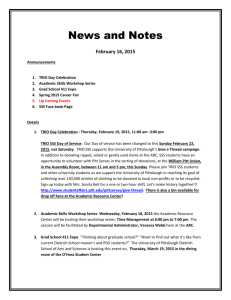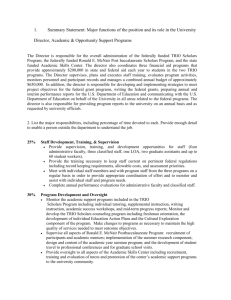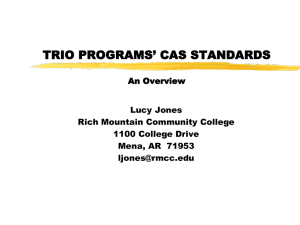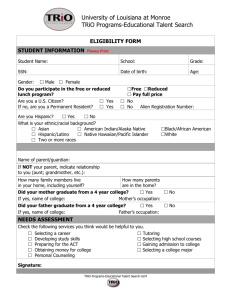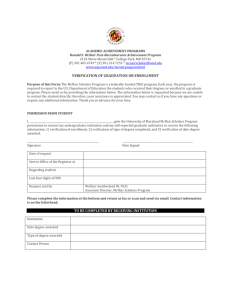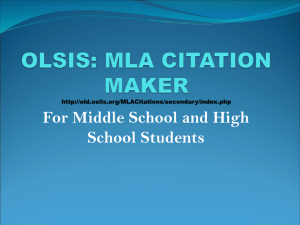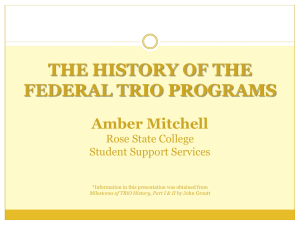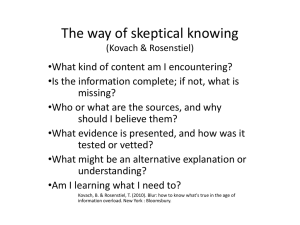Glossary - ASPIRE Online
advertisement
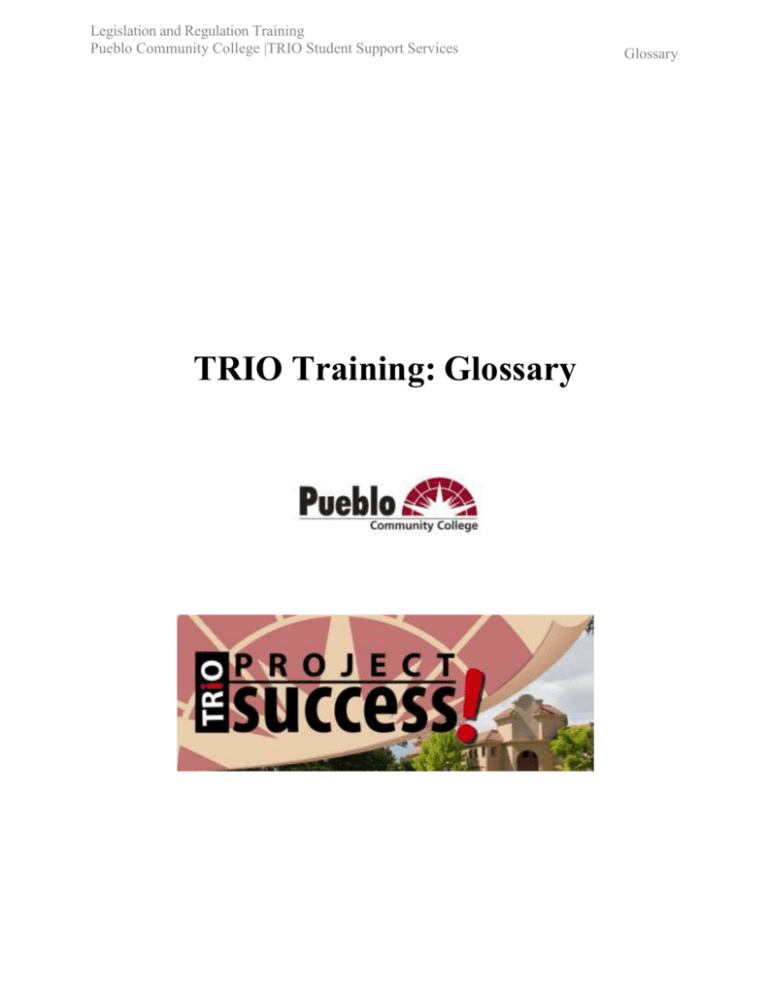
Legislation and Regulation Training Pueblo Community College |TRIO Student Support Services TRIO Training: Glossary Glossary Legislation and Regulation Training Pueblo Community College |TRIO Student Support Services Glossary Table of Contents A ...................................................................................................................................................... 1 Academic Need ........................................................................................................................... 1 Approved Proposal...................................................................................................................... 1 APR............................................................................................................................................. 1 B ...................................................................................................................................................... 1 Budget Period.............................................................................................................................. 1 C ...................................................................................................................................................... 1 CFR ............................................................................................................................................. 1 Cohort (SSS) ............................................................................................................................... 1 Cost Principles ............................................................................................................................ 1 E ...................................................................................................................................................... 1 ED ............................................................................................................................................... 1 EDGAR....................................................................................................................................... 1 Eligibility for Educational Opportunity Centers (EOC) ............................................................. 1 Eligibility for McNair ................................................................................................................. 2 Eligibility for Student Support Services (SSS) ........................................................................... 2 Eligibility for Talent Search (TS) ............................................................................................... 2 Eligibility for Upward Bound (UB) ............................................................................................ 3 Equipment ................................................................................................................................... 3 F ...................................................................................................................................................... 3 F&A ............................................................................................................................................ 3 Factors Affecting the Allowability of Costs ............................................................................... 3 Family Taxable Income .............................................................................................................. 3 Federal Register .......................................................................................................................... 4 Financial Audit............................................................................................................................ 4 First Generation Individual ......................................................................................................... 4 G...................................................................................................................................................... 4 GAN ............................................................................................................................................ 4 GEPA .......................................................................................................................................... 4 GPRA .......................................................................................................................................... 4 Graduate Education (McNair)..................................................................................................... 4 Grant Cycle ................................................................................................................................. 4 Groups Underrepresented (McNair) ........................................................................................... 4 H ..................................................................................................................................................... 4 HEA ............................................................................................................................................ 4 I ....................................................................................................................................................... 5 Independent Student.................................................................................................................... 5 Individual with Disabilities (SSS) .............................................................................................. 5 L ...................................................................................................................................................... 5 Low-income Individual............................................................................................................... 5 N...................................................................................................................................................... 5 Need ............................................................................................................................................ 5 Needs Assessment (EOC) ........................................................................................................... 5 Needs Assessment (McNair)....................................................................................................... 5 Legislation and Regulation Training Pueblo Community College |TRIO Student Support Services Glossary Needs Assessment (TS) .............................................................................................................. 5 Need for Academic Support or Academic Need (SSS) .............................................................. 5 Need for Academic Support (UB) .............................................................................................. 5 NPRM ......................................................................................................................................... 5 O...................................................................................................................................................... 5 OMB ........................................................................................................................................... 6 OMB Circular A-110 .................................................................................................................. 6 OMB Circular A-21 .................................................................................................................... 6 On-site Visit ................................................................................................................................ 6 P ...................................................................................................................................................... 6 Participant (EOC)........................................................................................................................ 6 Participant (SSS) ......................................................................................................................... 6 Participant (TS) ........................................................................................................................... 6 Participant (UB) .......................................................................................................................... 6 Potential First Generation College Student................................................................................. 6 Program Officer .......................................................................................................................... 6 Program Specialist ...................................................................................................................... 6 Project Period.............................................................................................................................. 6 S ...................................................................................................................................................... 6 Site Visit...................................................................................................................................... 6 Sufficient Financial Assistance (SSS) ........................................................................................ 6 Summer Internship (McNair)...................................................................................................... 6 T ...................................................................................................................................................... 7 Target Area (TS & EOC) ............................................................................................................ 7 Target Area (UB) ........................................................................................................................ 7 Target Population (McNair)........................................................................................................ 7 Target School .............................................................................................................................. 7 TRIO Legislation ........................................................................................................................ 7 TRIO Regulations ....................................................................................................................... 7 U...................................................................................................................................................... 7 Underrepresented Groups ........................................................................................................... 7 V ...................................................................................................................................................... 7 Veteran ........................................................................................................................................ 7 Legislation and Regulation Training Pueblo Community College |TRIO Student Support Services Glossary A Academic Need: See Need Approved Proposal: Approved grant that your supporting entity (institution, agency, secondary school, or a combination thereof) submitted for a TRIO project. APR: Annual Performance Report. The Department of Education uses this report to assess a grantee’s (your project’s) progress in meeting its approved goals and objectives, as well as determining prior experience points. B Budget Period: An interval of time into which a project period is divided for budgetary purposes. Also known as Project Year. Citation reference: EDGAR 77.1 C CFR: The Code of Federal Regulations Cohort (SSS): A group of participants who have the first year they participated in the project in common. Cost Principles: Provisions, established by the Office of Management and Budget (OMB), to be used in determining the allowability of costs incurred by recipients of grants. See EDGAR, 34 CFR 74.27 or 80.22 Allowable costs. These cost principles are published by OMB as Circulars A-21, A-87, and A-122. Educational institutions follow OMB Circular A21. States, local governments and Indian Tribes follow A-87. Non-profit organizations follow A-122. E ED: The Department of Education EDGAR: Educational Department General Administrative Regulations. Also known as the general regulations. Eligibility for Educational Opportunity Centers (EOC): 644.3 of the EOC regulations states that (a) An individual is eligible to participate in an Educational Opportunity Centers project if the individual meets all of the following requirements: (1)(i) Is a citizen or national of the United States; (ii) Is a permanent resident of the United States; (iii) Is in the United States for other than a temporary purpose and provides evidence from the Immigration and Naturalization Service of his or her intent to become a permanent resident; (iv) Is a permanent resident of Guam, the Northern Mariana Islands, or the Trust Territory of the Pacific Islands (Palau); or (v) Is a resident of the Freely Associated States—the Federal States of Micronesia or the Republic of the Marshall Islands. (2)(i) Is at least 19 years of age; or 1 Legislation and Regulation Training Pueblo Community College |TRIO Student Support Services Glossary (ii) Is less than 19 years of age, and the individual cannot be appropriately served by a Talent Search project under 34 CFR Part 643, and the individual’s participation would not dilute the Educational Opportunity Centers project’s services to individuals described in paragraph (a)(2)(i) of the section. (3) Expresses a desire to enroll, or is enrolled, in a program of postsecondary education, and requests information or assistance in applying for admission to, or financial aid for, such a program. (b) A veteran as defined in §644.7(b), regardless of age, is eligible to participate in an Educational Opportunity Centers project if he or she satisfies the eligibility requirements in paragraph (a) of this section other than the age requirement in paragraph (a)(2) of this section. Eligibility for McNair: §647.3 of the McNair Regulations states that an individual is eligible to participate in a McNair project if the individual meets the following requirements: (a)(1) is a citizen or national of the Unites States; (2) is a permanent resident of the United States; (3) is in the United States for other than a temporary purpose and provides evidence from the Immigration and Naturalization Service of his or her intent to become a permanent resident; (4) is a permanent resident of Guam, the Northern Mariana islands, or the Trust Territory of the Pacific Islands; or (5) is a resident of one of the Freely Associated States. (b) Is currently enrolled in a degree program at an institution of higher education that participates in the student financial assistance programs authorized under Title IV of the HEA. (c) Is (1) a lowincome individual who is a first-generation college student; (2) a member of a group that is underrepresented in graduate education; or (3) a member of a group that is not listed in §647.7 if the group is underrepresented in certain academic disciplines as documented by standard statistical references or other national survey data submitted to and accepted by the Secretary on a case-by-case basis. (d) Has not enrolled in doctoral level study at an institution of higher education. Eligibility for Student Support Services (SSS): 646.3 of the SSS regulations states that an individual is eligible to participate in a Student Support Services project if the student meets all of the following requirements: (a) Is a citizen or national of the United States or meets the residency requirements for Federal student financial assistance; (b) is enrolled at the grantee institution or accepted for enrollment in the next academic term at that institution; (c) has a need for academic support, as determined by the grantee, in order to pursue successfully a postsecondary educational program; (d) is 1) a low-income individual; 2) a first generation college student; or 3) an individual with disabilities. Eligibility for Talent Search (TS): 643.3 of the TS regulations states that an individual is eligible to participate in a Talent Search Project if the individual meets the following requirements: (1)(i) Is a citizen or national of the United States or meets the residency requirements in 643.3. (2)(i) Has completed fie years of elementary education or is at least 11 years of age but not more than 27 years of age. (ii) However, an individual who is more than 27 years of age may participate in a Talent Search project if the individual cannot be appropriately served by an Educational Opportunity Center project under 34 CFR Part 644 and if the individual’s participation would not dilute the Talent Search project’s services to individuals described in paragraph (a)(2)(i) of this section. 2 Legislation and Regulation Training Pueblo Community College |TRIO Student Support Services Glossary (3)(i) Is enrolled in or has dropped out of any grand from six through 12, or has graduated from secondary school, has potential for a program of postsecondary education, and needs one or more of the services provided by the project in order to undertake such a program; or (ii) Has undertaken, but is not presently enrolled in, a program of postsecondary education, has the ability to complete such a program, and needs one or more of the services provided by the project to reenter such a program. (b) A veteran as defined in §643.6(b), regardless of age, is eligible to participate in a Talent Search project if he or she satisfies the eligibility requirements in paragraph (a) of this section other than the age requirement in paragraph (a)(2). Eligibility for Upward Bound (UB): 645.3 of the UB regulations states that in individual is eligible to participate in a Regular, Veterans, or a Math and Science Upward Bound project if the individual meets all of the following requirements: (a)(1) Is a citizen or national of the United States; (2) is a permanent resident of the United States; (3) Is in the United States for other than a temporary purpose and provides evidence from the Immigration and Naturalization Service of his or her intent to become a permanent resident; (4) is a permanent resident of Guam, the Northern Mariana Islands, or the Trust Territory of the Pacific Islands; (5) is a resident of the Freely Associated States—the Federated States of Micronesia, the Republic of Marshall Islands, or the Republic of Palau. (b) Is (1) A potential first-generation college student; or (2) a low-income individual. (c) Has need for academic support, as determined by the grantee, in order to pursue successfully a program of education beyond high school. (d) At the time of initial selection, has completed the eighth grade but has not entered the twelfth grade and is at least 13 years old but not older than 19, although the Secretary may waive the age requirement if the applicant demonstrates that the limitation would defeat the purposes of the Upward bound program. However, a veteran as defined in §645.6, regardless of age, is eligible to participate in an Upward Bound project if he or she satisfies the eligibility requirements in paragraphs (a), (b), and (c) of this section. Equipment: An article of nonexpendable, tangible personal property having a useful life of more than one year and an acquisition cost which equals or exceeds the lesser of the capitalization level established by the institution for financial statement purposes, or $5,000. Citation reference: EDGAR 74.34(f)(1)(i-ix) F F&A: Costs that are incurred for common or joint objective and therefore cannot be identified readily and specifically with a particular sponsored project. Synonymous with indirect costs. Also known as overhead costs. Citation: OMB Circular A-21B Factors Affecting the Allowability of Costs: a) are the expenditures reasonable; b) are they allocable to the funded grant; c) are they given consistent treatment; and d) do they conform to any limitations or exclusions set forth in A-21 or in the sponsored agreement as to types or amounts of cost items. Family Taxable Income: 1) With regard to a dependent student, the taxable income of the individual’s parents; 2) With regard to a dependent student who is an orphan or ward of the court, no taxable income; 3) With regard to an independent student, the taxable income of the student and his or her spouse. 3 Legislation and Regulation Training Pueblo Community College |TRIO Student Support Services Glossary Federal Register: EDGAR, Appendix F, 5. Federal Register, states how the Public of Federal Register is published every federal working day. Notices of Proposed Rule Making, closing dates for applications, etc. are all published in the Federal Register. Financial Audit: According to Government Auditing Standards (GAS), financial audits are primarily concerned with providing reasonable assurance about whether financial statements are presented fairly in all material respects in conformity with generally accepted accounting principles (GAAP), or with a comprehensive basis of accounting other than GAAP. Other objectives of financial audits, which provide for different levels of assurances and entail various scopes of work may include: 1) providing special reports for specified elements, accounts, or items of a financial statement; 2) reviewing interim financial information; 3) issuing letters for underwriters and certain other requesting parties; 4) reporting on the processing of transactions by service organizations; and 5) auditing compliance with regulations relating to federal award expenditures and other governmental financial assistance in conjunction with or as a byproduct of a financial statement audit. First Generation Individual: (A) An individual both of whose parents did not complete a baccalaureate degree; or (B) in the case of any individual who regularly resided with and received support from only one parent, an individual whose only such parent did not complete a baccalaureate degree. Citation reference: HEA 402A (f)(1). G GAN: Grant Award Notification GEPA: General Education Provisions Act. Section 427 of GEPA affects applicants for new grant awards under this program. This section requires each applicant for funds (other than an individual person) to include in its application a description of the steps the applicant proposes to take to ensure equitable access to, and participation in, its Federally-assisted program for students, teachers, and other program beneficiaries with special needs. GPRA: The Government Performance and Results Act of 1993. This statue requires all federal agencies to manage their activities. Each agency is to clearly state what it intends to accomplish, identify the resources required, and periodically report their progress to the Congress. In so doing, it is expected that the GPRA will contribute to improvements in accountability for the expenditures of public funds, improve Congressional decision-making through more objective information on the effectiveness of federal programs, and promote a new government focus on results, service delivery, and customer satisfaction. Graduate Education (McNair): Studies beyond the bachelor’s degree leading to a postbaccalaureate degree. Citation reference: §647.7(b) Grant Cycle: See Project Period Groups Underrepresented (McNair): The following ethnic and racial groups currently underrepresented in graduate education: Black (non-Hispanic), Hispanic, and American Indian/Alaskan Native. Citation reference: §647.7(b) H HEA: Higher Education Act of 1965, as amended. Also known as the TRIO legislation. 4 Legislation and Regulation Training Pueblo Community College |TRIO Student Support Services Glossary I Independent Student: 1) Is 24 years of age or older by December 31 of the award year; 2) is an orphan or ward of the court or was a ward of the court until the individual reached the age of 18; 3) is a veteran of the Armed Forces of the United States (as defined in subsection (c)(1)); 4) is a graduate or professional student; 5) is a married individual; 6) has legal dependents other than a spouse; or 7) is a student for whom a financial aid administrator makes a documented determination of independence by reason of other unusual circumstances. Individual with Disabilities (SSS): A person who has a diagnosed physical or mental impairment that substantially limits that person’s ability to participate in the educational experiences and opportunities offered by the grantee institution. L Low-income Individual: An individual from a family whose taxable income for the preceding year did not exceed 150 percent of an amount equal to the poverty level determined by using criteria of poverty established by the Bureau of the Census. Citation reference: (HEA 402A (f)(2)). N Need: One of the criteria the project must use to determine a potential participant’s eligibility. One key concept informing need is the participant’s ability to benefit/succeed as a result of project services. In some programs the ED defines ‘Need’ in the definitions section of the regulations. In other programs, the need is evident elsewhere in the regulations. The program specific definition and/or reference vary; please see below. Needs Assessment (EOC): As it relates to an EOC participant: a documented need for one or more of the services provided by the project in order to undertake a program of postsecondary education. Citation reference: §644.7 Needs Assessment (McNair): As it relates to a McNair participant: a documented need for one or more of the services proved by the project in order to undertake a program of doctorial education. Citation reference: Citation reference: §647.32(b)(2) Needs Assessment (TS): As it relates to a TS participant: a documented need for one or more of the services provided by the project in order to undertake a program of secondary or postsecondary education. Citation reference: §643.3(a)(3)(i-ii). Need for Academic Support or Academic Need (SSS): A student whom the grantee determines needs one or more of the services stated under §646.4 to succeed in a postsecondary educational program. Citation reference: §646.7(b). Need for Academic Support (UB): Has a need for academic support, as determined by the grantee, in order to pursue successfully a program of education beyond high school. Citation reference: §645.3(c). NPRM: Notice of Proposed Rule Making O 5 Legislation and Regulation Training Pueblo Community College |TRIO Student Support Services Glossary OMB: Office of Management and Budget OMB Circular A-110: The Office of Management and Budget uniform administrative requirements that relate to TRIO programs. OMB Circular A-21: The Office of Management and Budget general cost principles that relate to TRIO programs. On-site Visit: See Site Visit P Participant (EOC): An individual who: (i) Is determined to be eligible to participate in the project under §644.3; and (ii) Receives project services. Participant (SSS): An individual who: (1) is determined to be eligible to participate in the project under §646.3; and 2) receives project services to be sufficient to increase the individual’s chances for success in a postsecondary educational program. Participant (TS): An individual who 1) is determined to be eligible to participate in the project under §643.3; and 2) receives project services designed for his or her age or grade level. Citation reference: §643.7 Participant (UB): An individual who (1) is determined to be eligible to participate in the project under §645.3; (2) resided in the target area or is enrolled in a target school at the time of acceptance into the project; and (3) has been determined by the project director to be committed to the project, as evidenced by being allowed to continue in the project for at least (i) ten days in a summer component if the individual first enrolled in an Upward Bound project’s summer component; or (ii) sixty days if the individual first enrolled in an Upward Bound project’s academic year component. Citation reference: 645.6 Potential First Generation College Student: (A) An individual neither of whose natural or adoptive parents received a baccalaureate degree; or (B) A student who, prior to the age of 18, regularly resided with and received support from only one natural or adoptive parent and whose supporting parent did not receive a baccalaureate degree. Program Officer: See Program Specialist Program Specialist: Also known as Program Officer. The representative of the Education Department responsible for a specific grant; identified in block 3 of the Grant Award Notification as the Education Program Contact. Project Period: Period established in the award document during which Federal sponsorship begins and ends. Usually synonymous with Grant Cycle. Citation reference: EDGAR 74.2 S Site Visit: Also on-site visit. When a representative of the Education Department visits a grantee for the purpose of reviewing one or more ED grants awarded to that grantee. Sufficient Financial Assistance (SSS): The amount of financial aid offered a Student Support services student, inclusive of Federal, State, local, private, and institutional aid which, together with parent or student contributions, is equal to the cost of attendance as determined by a financial aid officer at the institution. Summer Internship (McNair): An educational experience in which participants, under the guidance and direction of experienced faculty researchers, are provided an opportunity to engage in research or other scholarly activities. Citation reference: 647.7(b) 6 Legislation and Regulation Training Pueblo Community College |TRIO Student Support Services Glossary T Target Area (TS & EOC): Geographic area served by a Talent Search or an Educational Opportunity Centers project. Target Area (UB): A discrete local or regional geographical area designated by the applicant as the area to be served by an Upward Bound project. Citation reference: 645.6 Target Population (McNair): The universe from which McNair participants will be selected. The universe may be expressed in terms of geography, type of institution, academic discipline, type of disadvantage, type of underrepresentation, or any other qualifying descriptor that would enable an applicant to more precisely identify the kinds of eligible project participants they wish to serve. Citation reference: 647.7(b) Target School: A school designated by the applicant as a focus of project services. TRIO Legislation: All TRIO programs are authorized in the Higher Education Act of 1965, as amended, Title 4, Part A, Subpart 2, Chapter 1, Section 402A. 402A is the umbrella for all TRIO programs; 402B is the section authorizing Talent Search; 402C is the section authorizing Upward Bound; 402D is the section authorizing Student Support Services; 402E is the section authorizing McNair; 402F is the section authorizing Educational Opportunity Centers. TRIO Regulations: The Code of Federal Regulations (CFR). All Department of Education Regulations are found in Title 34 of the Code of Federal Regulations (34 CFR). These regulations include 1) Part 74 and 75 (which are found in EDGAR); 2) Part 643 constituting the Talent Search program specific regulations, Part 644 constituting the Educational Opportunity Centers program specific regulations; 3) OMB Circulars and Expanded Authorities incorporated by reference. When CFR or TRIO Regulations are referenced, either one can potentially include all of the above. U Underrepresented Groups: See Groups Underrepresented V Veteran: A person who served on active duty as a member of the Armed Forces of the United States 1) for a period of more than 180 days, any part of which occurred after January 31, 1955, and who was discharged or released from active duty under conditions other than dishonorable; or 2) After January 31, 1955, and who was discharged or released from active duty because of a service-connected disability. Citation reference: HEA 402A (f)(3) 7

